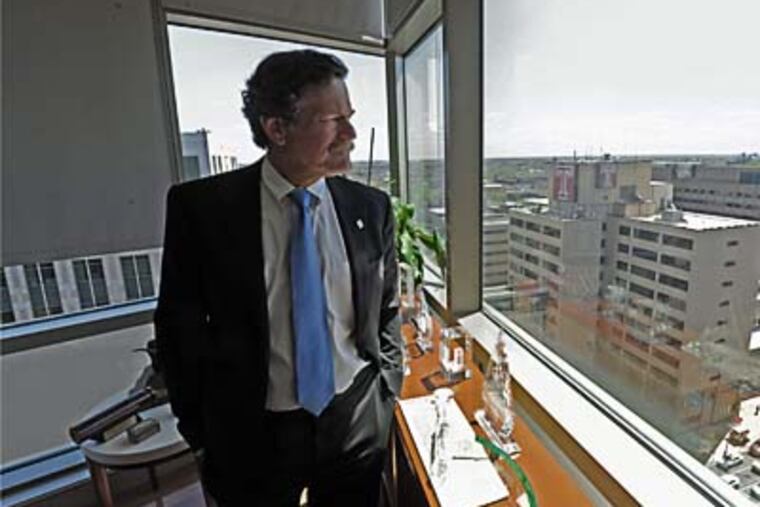Growth is CEO’s diagnosis for Temple health system
Larry Kaiser, at the helm of Temple University Health System in North Philadelphia for a year, is crafting a bold plan to steer the organization out of the financial morass of being Philadelphia’s unofficial public hospital for the poor.

Larry Kaiser, at the helm of Temple University Health System in North Philadelphia for a year, is crafting a bold plan to steer the organization out of the financial morass of being Philadelphia's unofficial public hospital for the poor.
So far, he has engineered the $83.8 million purchase of the Fox Chase Cancer Center — a deal expected to close July 1 — and overseen the opening of an outpatient facility in Oaks that is drawing suburban patients with better-paying insurance and has treated 40 percent more patients than budgeted.
Kaiser has also recruited more than a dozen high-profile physicians to Temple University Hospital, with a focus on innovative surgeons expected to fill the operating rooms with patients from outside Temple health's core North Philadelphia market.
"There's a lot of excitement, and there's a lot of hope," said one of those recruits, Daniel Eun, a robotic surgeon who left Pennsylvania Hospital for Temple University Hospital.
Both of Kaiser's key strategies are designed to balance out the system's large base of money-losing Medicaid patients, who accounted for 42 percent of Temple's discharges in the year ended June 30.
Kaiser, who is also dean of the Temple University School of Medicine, said he has no intention of abandoning the poor who have counted on Temple for decades.
"We're very interested in working with the population that we serve" while adding "physicians who the population at large would want to come to as well," he said in an interview this month.
But strengthening the Temple health system, which had nearly $133 million in operating losses from 2008 through 2010, at its current revenue level, will not be enough in Kaiser's view to achieve long-term financial stability.
"From an economy of scale perspective and from a cost-savings perspective, you probably need to be larger than where we are now. We're currently a little over a $1 billion organization. Ideally, we should be a $3 billion to $5 billion operation in order to effectively compete," said Kaiser, 59, a former chairman of surgery at the University of Pennsylvania Health System.
Kaiser, who left his job as president of University of Texas Health Science Center at Houston to join Temple, has set himself a large target. The Jefferson Health System, which includes Main Line Health and is the largest health system in the Philadelphia region, had $2.95 billion in revenue during the year ended June 30.
Kaiser declined to discuss possible merger partners. He predicted that consolidation would occur within the next two years in the Philadelphia region, which has just two dominant private insurers, in Independence Blue Cross and Aetna, but numerous relatively small health systems.
Kaiser intends to make Temple one of the survivors. "We would like to be a must-have for any sort of limited network that the insurers would want to form," he said.
Industry experts said there is no way to replace Temple as a provider of care to the city's poor, but they have a hard time seeing how Temple can overcome the economic challenges of its location given its relative lack of money.
"I'm kind of puzzled as to how Temple fights its way out," said Alan Zuckerman, president of Health Strategies & Solutions Inc. in Philadelphia.
Patrick O'Connor, chairman of the board of trustees at Temple University, which owns the health system, acknowledged the health system's difficult position, but expressed complete confidence in Kaiser: "If anyone can carry the day, it's him."
Temple participated in an earlier wave of hospital consolidation, assembling a network of institutions that included Lower Bucks, Jeanes, Neumann, Northeastern, and Episcopal. Only Jeanes remains part of Temple as an acute-care hospital.
Labor conditions at the system have changed since a 2010 Temple hospital strike. A representative from the Pennsylvania Association of Staff Nurses & Allied Professionals, a union that represents 1,600 of the Temple health system's 6,549 employees, said management arrogance had disappeared. "The new administration clearly understands that they need to have a productive relationship with us," Jerry Silberman, a senior staff representative for the union.
A leader can make a huge difference, said Michael D. Rosko, a professor of health-care management at Widener University. "The leader establishes the culture, establishes goals and objectives, can energize people," Rosko said.
Three new Temple doctors, including Eun, said Kaiser's leadership convinced them to come to Temple.
"It think it's probably a combination of charisma, visionary leadership, a can-do attitude, and a sound strategy," said Selwyn O. Rogers who will become chairman of the department of surgery at Temple school of medicine and surgeon-in-chief of the health system in July.
Rogers is now at Harvard Medical School and the affiliated Brigham and Women's Hospital in Boston,
T. Sloane Guy, who started last June as chief of cardiothoracic surgery at Temple University Hospital, said he was being recruited to head Temple's cardiac surgery program before Kaiser joined Temple and had decided not to leave St. Joseph's Hospital in Atlanta for the job.
After hearing that Kaiser was taking over, Guy, who trained under Kaiser at Penn, signed on. "I knew that if he had bet on this place, it was doable," said Guy of the turnaround effort at Temple.
A 22-year Temple veteran also said he was pleased. "I've seen a lot of CEOs and department chiefs and chairs come and go over the years, said Thomas Klumpp, who is a Temple professor of medicine and works in the bone marrow transplant program.
"Both I as well as my colleagues have been favorably impressed and optimistic that things are going to be heading in the right direction," said Klumpp.
Contact Harold Brubaker at 215-854-4651 or hbrubaker@phillynews.com.